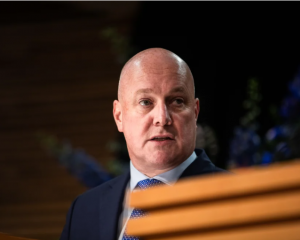The deal unanimously passed its first reading in Parliament last night.
A "ratchet clause relativity mechanism" was written into the historic deals signed by Ngai Tahu and Tainui, which provides that if all treaty settlements should exceed $1 billion, the iwi could negotiate top-ups.
Tainui reached a settlement with the Crown in 1995 and Ngai Tahu in 1997, with both deals including the ratchet clauses and worth $170 million each.
The Treelords deal is believed to have pushed settlements - worth $700 million to date - over the $1 billion threshold, but yesterday in Parliament Treaty Negotiations Minister Dr Michael Cullen denied this was the case.
In answer to questions by Maori Party co-leader Dr Pita Sharples in the House yesterday, Dr Cullen said that "adding up the nominal or current dollar figures of new settlements until they reach $1 billion cannot be used to calculate when the mechanism is triggered".
This was because the $1 billion trigger point was in 1994 dollar terms, Dr Cullen said.
Mr Potiki said "there is definitely some subjectivity with the whole thing".
After yesterday's signing, it was likely Ngai Tahu would negotiate with the Government over the clause, Mr Potiki said.
"But the whole thing is so . . . complex. It could mean tens of millions of dollars for Ngai Tahu, but it will mean a lot of negotiations."
The outcome of any negotiations may not be reached for several years, he said.
Last night, central North Island Maori packed Parliament's public galleries as MPs unanimously passed the first reading of a Bill that will enact the biggest Treaty of Waitangi settlement.
A few hours earlier, the Crown and seven iwi signed the $400 million-plus agreement that will hand over 176,000ha of state-owned forest.
The iwi in the collective - Ngati Tuhoe, Ngati Tuwharetoa, Ngati Whakaue, Ngati Whare, Ngati Manawa, Raukawa and the affiliate Te Arawa iwi and hapu - represent more than 100,000 people.
"This settlement will make the collective the largest single landowner in the forestry sector in this country," Dr Cullen told Parliament during the Bill's first reading debate.
"It removes the uncertainty over the future ownership of the land.
"The future role of the industry for the collective iwi will be positive for members who are participants, the wider region and the nation as a whole."
National Party MP Georgina te Heuheu praised the leadership of those who signed the settlement.
"The original injustice goes back several generations, the ramifications flow on to future generations," she said.
"To do it shows vision, courage and a great compassion and love for the people. Those values are not always on show in our national consciousness."
The Central North Island Forests Land Collective Settlement Bill will be considered by the Maori affairs select committee and is expected to become law before the election.
Raukawa and the Crown yesterday signed terms of negotiations, marking the beginning of the process to settle the iwi's outstanding historic Treaty of Waitangi claims.
Dr Cullen said the initial focus of the negotiations would be claims over the Waikato River.
Treelords deal
• The Crown and seven iwi yesterday signed the $400 million-plus deal.
• Largest agreement reached in Treaty of Waitangi settlements process.
• Deal involves $195.7m of Crown forest land (176,000ha), $223m in rentals and an annual income stream of $13m.
• The seven iwi are Ngai Tuhoe, Ngati Tuwharetoa, Ngati Whakaue, Ngati Whare, Ngati Manawa, Raukawa and the affiliate Te Arawa iwi and hapu.
• The Central North Island Iwi Collective will be the largest forestry land owner in the country.
• The settlement involves nine forests in the central North Island, representing about 10% of New Zealand's plantation forests.
• The vast majority of the land is part of Kaingaroa Forest.












